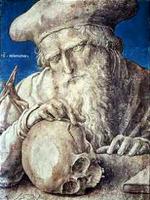 Saint Jerome (Eusebius Sophronius Hieronymus), translator of Holy Scripture, was born in a little Dalmatian village on the Adriatic Sea around the year AD 345. Although he came from Christian parents, he wasn't baptized until he went to study in Rome in about AD 360. After extensive travels, he chose the life of a monk and spent five years in the Syrian desert. There he learned Hebrew, the language of the Old Testament. However, the time spent there convinced him that the life of a hermit monk was not for him and he pursued holy orders and advanced education.
Saint Jerome (Eusebius Sophronius Hieronymus), translator of Holy Scripture, was born in a little Dalmatian village on the Adriatic Sea around the year AD 345. Although he came from Christian parents, he wasn't baptized until he went to study in Rome in about AD 360. After extensive travels, he chose the life of a monk and spent five years in the Syrian desert. There he learned Hebrew, the language of the Old Testament. However, the time spent there convinced him that the life of a hermit monk was not for him and he pursued holy orders and advanced education.After ordination at Antioch and visits to Rome and Constantinople (where he studied under Gregory of Nazianzus), Jerome settled in Bethlehem. From the original Hebrew, Aramaic, and Greek, he used his ability with languages to translate the Bible into Latin, the common language of his time.
Jerome chose to use "street" or "vulgar" Latin rather than its classical form. Thus, his translation was called the Vulgate (from its vulgar Latin) and was the authoritative version of the Bible in the western Church for over 1,000 years.
A man of considerable brilliance, Jerome could also be argumentative, arrogant, dogmatic in trivial matters, and easily swayed by people holding superior office. Yet he also was able to break with the influence of Origen under which he was raised and was a champion of understanding the original languages of Scripture and of exegesis over allegory in interpretation. In Roman Catholic hagiography, he is patron saint of translators and librarians. His symbol in Christian symbolism is often a pen. In art, he is often portrayed with an odd blend of clothing and trappings from an aescetic anchorite and a cardinal and is usually posed with a crucifix, a skull, and a Bible.
Considered one of the great scholars of the early church, he is listed with Saints Augustine, Ambrose, and Gregory the Great as one of the original Four Doctors of the Western Church. These four, plus four Eastern theologians, compose the eight Great Doctors of the early Church (see this article on Saint Ambrose for the entire list). He died on 30 September AD 420. Originally interred at Bethlehem, his remains were eventually taken to Rome.
More information is available from James Kiefer's Hagiographies and Wikipedia.
Lection
Psalm 19:7-11(12-14) or 119:97-104
2 Timothy 3:14-17
Luke 24:44-48
Collect
O Lord, O God of truth, whose Word is a lantern to our feet and a light upon our path: We give you thanks for your servant Jerome, and those who, following in his steps, have labored to render the Holy Scriptures in the language of the people; and we pray that your Holy Spirit will overshadow us as we read the written Word, and that Christ, the living Word, will transform us according to your righteous will; through Jesus Christ our Lord, who lives and reigns with you and the Holy Spirit, one God, now and forever.
Technorati Tags: Saint Jerome | Jerome | Hieronymus | Eusebius Sophronius Hieronymus | Vulgate | Latin Bible | translation | Doctors of the Church
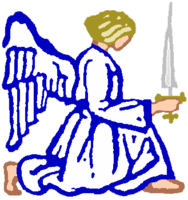 On the Feast of St. Michael and all Angels (or Michaelmas) we thank God for the many ways in which He lovingly watches over us, both directly and indirectly. We also remember that the richness and variety of God's creation far exceeds our knowledge of it.
On the Feast of St. Michael and all Angels (or Michaelmas) we thank God for the many ways in which He lovingly watches over us, both directly and indirectly. We also remember that the richness and variety of God's creation far exceeds our knowledge of it.The angels are referred to as "messengers of God," or simply as "messengers." The word for a messenger in Hebrew is malach, in Greek, angelos, from which we get our word "angel."
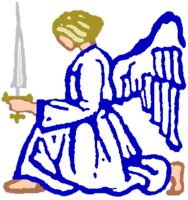 Michael (the name means "Who is like God?") is said to be the captain of the heavenly armies. In the Scriptures, Daniel (10:13, 21; 12:1) calls him prince of the people of Israel; Jude 9 notes an apocryphal story of a dispute with the devil about the body of Moses; Revelation 12:7 shows him leading the heavenly armies against those of the great dragon. He is often pictured in full armor, carrying a lance, and with his foot on the neck of a dragon.
Michael (the name means "Who is like God?") is said to be the captain of the heavenly armies. In the Scriptures, Daniel (10:13, 21; 12:1) calls him prince of the people of Israel; Jude 9 notes an apocryphal story of a dispute with the devil about the body of Moses; Revelation 12:7 shows him leading the heavenly armies against those of the great dragon. He is often pictured in full armor, carrying a lance, and with his foot on the neck of a dragon.Why do we call him "Saint" Michael? Isn't this word reserved for God's holy people? Well, the word actually means "holy," that is dedicated and set aside for a special Godly purpose or having an intrinisic goodness. All of God's people are holy because of Christ. Therefore, all are saints — especially the dead in Christ. Because they are completely sinless, Michael and all the angels are "holy" and thus may be called saints.
 Many theologians through the centuries have suggested that Michael is actually a theophany, a divine manifestation of the Son of God. Reading the passages where he is mentioned doesn't convince me entirely one way or another. The name itself is intriguing: If we answer the question, "Who is like God?" we must say, "No one, except God."
Many theologians through the centuries have suggested that Michael is actually a theophany, a divine manifestation of the Son of God. Reading the passages where he is mentioned doesn't convince me entirely one way or another. The name itself is intriguing: If we answer the question, "Who is like God?" we must say, "No one, except God."Also, while Christian literature, liturgics, and hymnody is filled with references to archangels, Michael is the only being in Scripture called an archangel. The prefix normally means ruling, chief, or principal and can also carry the meaning of a prototype or an earlier model.
 We know that Jesus testifies of His Father: He was and remains the principal (arch-) messenger of God's grace. He also preceded the existence of the angels, being alive from all eternity. In fact, He not only is the great messenger of God's Word, He is God's Word. Thus, understanding the Son as the archangel, the primary and ruling messenger of the Father is totally congruent with Scripture's revelation.
We know that Jesus testifies of His Father: He was and remains the principal (arch-) messenger of God's grace. He also preceded the existence of the angels, being alive from all eternity. In fact, He not only is the great messenger of God's Word, He is God's Word. Thus, understanding the Son as the archangel, the primary and ruling messenger of the Father is totally congruent with Scripture's revelation.I say this not to attempt to persuade the reader to accept the idea that Michael is the Son of God but to open the mind to the possiblity that they could be one and the same.
 As for the angels, there are numerous times and places where they are mentioned. Yet all the spirit beings who serve God are not called angels by Scripture. While we often in our thinking lump them together, a number of distinct created beings exist.
As for the angels, there are numerous times and places where they are mentioned. Yet all the spirit beings who serve God are not called angels by Scripture. While we often in our thinking lump them together, a number of distinct created beings exist.When reading the Pauline epistles, many early theologians took as titles some of the descriptive language he used in writing of the spiritual realm. They came up with nine "choirs" or ranks of angels, normally grouped in three triads. Their order varied among the different commentators. For example, Pseudo-Dionysias ranked them (in ascending order) as seraphim, cherubim, thrones, dominions, virtues, powers, principalities, archangels, and angels.
 Cherubim, seraphim, angels and at least one archangel we know of definitely from the Bible. Whether or not "thrones, dominions, virtues," and the like are also specific creatures or whether they're rather general characteristics of the spirit beings, these lists appear to have omitted one class of being in Scripture, the "four living creatures" mentioned in Ezekiel and Revelation.
Cherubim, seraphim, angels and at least one archangel we know of definitely from the Bible. Whether or not "thrones, dominions, virtues," and the like are also specific creatures or whether they're rather general characteristics of the spirit beings, these lists appear to have omitted one class of being in Scripture, the "four living creatures" mentioned in Ezekiel and Revelation.These lists have made it into our liturgy, where the Communion Preface speaks of "angels and archangels and all the company of heaven." They've also been incorporated into our hymnody, most notably "Ye Watchers and Ye Holy Ones."
James Kiefer's Hagiographies give even more details on the choirs of angels and related material with Mr. Kiefer's article on Michael and All Angels.
Lection
103:19-22 or Psalm 103:1-5, 20-22
Joshua 5:13-15 or Daniel 10:10-14; 12:1-3
Revelation 12:7-12
Matthew 18:1-11 or Luke 10:17-20
Collect
O everlasting God, whose wise planning has ordained and constituted the ministry of men and angels in a wonderful order, mercifully grant that, as Your holy angels always serve You in heaven, so by Your appointment they may also help and defend us here on earth; through Jesus Christ, Your Son, our Lord, who lives and reigns with You and the Holy Spirit, one God, now and forever.
Hymn
Ye Watchers and Ye Holy Ones
Ye watchers and ye holy ones,
Bright seraphs, cherubim, and thrones,
Raise the glad strain, Alleluia!
Cry out, dominions, princedoms, powers,
Virtues, archangels, angels' choirs,
Alleluia! Alleluia!
O higher than the cherubim,
More glorious than the seraphim,
Lead their praises, Alleluia!
Thou Bearer of the eternal Word,
Most gracious, magnify the Lord,
Alleluia! Alleluia!
Respond, ye souls in endless rest,
Ye patriarchs and prophets blest,
Alleluia! Alleluia!
Ye holy Twelve, ye martyrs strong,
All saints triumphant, raise the song,
Alleluia! Alleluia!
O friend, in gladness let us sing,
Supernal anthems echoing,
Alleluia! Alleluia!
To God the Father, God the Son,
And God the Spirit, Three in One,
Alleluia! Alleluia!
Technorati Tags: Saint Michael and All Angels | Saint Michael | St. Michael and All Angels | St. Michael | Michaelmas | archangels | angels | Ye Watchers and Ye Holy Ones | theophany
The "Good King Wenceslaus" of whom we sing is also known as Wenceslas, Václav, Wenzel, and by other variations on his name. Wenceslaus actually wasn't a king (he was Duke of Bohemia). However, we still reckon Wenceslaus I as "good" because of his fidelity to the Christian Faith.
His grandfather, Bořivoj I, Kníze (Duke) of the Czechs was converted by Saints Cyril and Methodius, the noted missionaries to the Slavic people. After his father Wratislaus (Vratislav) I died in battle against the Magyars, Wenceslaus was in line for succession. His grandmother's teaching slowly led him into following the teaching of the Christian Church rather than that of his mother Drahomíra the Arrogant, who was a token Christian while her husband lived but then reverted to the old religion upon his death. Wenceslaus's (twin?) brother Boleslaus I (the Cruel) apparently followed his mother's pagan ways. Their sister Střezislava received the appellation "the Pretty."
After Wratislaus died, Wenceslaus was raised by his grandmother Ludmila (Ludmilla), who reared him in the Faith. Wenceslaus was a minor, so Ludmila governed as regent. A dispute between the fervently Christian regent and Drahomíra drove Ludmila to seek sanctuary near Beroun. Evidently, Wenceslaus's conversion had enraged his mother, who was also trying to gain support among the pagan nobility. Drahomíra purportedly gained revenge by having Ludmila killed by two nobles at Tetin on 15 September 921.
The regency passed to Drahomíra, who evidently gave good account of herself in that area. She strengthened Czech borders against foreign incursions and suppressed the rival Slavnik clan. However, she still worked to reconvert her son to paganism, but Wenceslaus continued practicing Christianity in secret.
Upon attaining his majority, Wenceslaus assumed the rule and exiled Drahomíra. He aided Christianity's spread throughout Bohemia by building churches and cathedrals and also by accepting the influence of the Holy Roman Empire. To the nobles, such behavior threatened both their pagan traditions and Czech sovereignty. He became a vassal of King Henry I the Fowler of Germany in 929. This submission, whether by choice or by force, further increased the hostility of his non-Christian lieges.
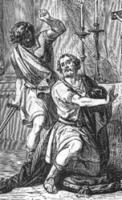 Boleslaus gathered some of these disaffected nobles around himself for several overlapping purposes. First of all, Wenceslaus was a threat to their paganism (unlike Wenceslaus, Boleslaus completely agreed with his mother's beliefs). Secondly, they considered Wenceslaus a "sell-out" if not an outright traitor to Czech heritage and governance. Finally, Boleslaus was next in line for the throne — something he strongly coveted.
Boleslaus gathered some of these disaffected nobles around himself for several overlapping purposes. First of all, Wenceslaus was a threat to their paganism (unlike Wenceslaus, Boleslaus completely agreed with his mother's beliefs). Secondly, they considered Wenceslaus a "sell-out" if not an outright traitor to Czech heritage and governance. Finally, Boleslaus was next in line for the throne — something he strongly coveted.These factors led the younger brother to invite the elder to a celebration of the Feast of Saints Cosmas and Damian. On the way there, Boleslaus or his henchmen murdered Wenceslaus — the most commonly purported venue being at the very doors of the church toward which they traveled. Bolesaus claimed the title "Prince" — "Duke" being considered recognition of vassalage to the Holy Roman Empire.
Upon his death, his son Boleslaus II became Duke of Bohemia. Contrary to the father's nickname "the Cruel," the younger son was known as Boleslav the Pious. Included among his accomplishments was the establishment of the Bishopric of Prague.
Meanwhile, the legend of Wenceslaus continued to grow in the telling. His piety and refusal to abandon Christianity remain part of the story of the Faith. The Church considered him a martyr and purported miracles followed his invocation. Thus, he was canonized as Saint Wenceslaus. He is the primary patron of the Czech people and the Czech Republic.
The Christmas carol Good King Wenceslas was based upon a perception of his piety, humility, and desire to serve. Whether or not grounded in an actual event, it reflects the esteem in which the Czech people hold him.
Technorati Tags: Wenceslaus | Wenceslaus I of Bohemia | Good King Wenceslaus | Václav | Wenzel | Bohemia | Czech | martyr | martyrdom | patron saint
Lancelot Andrewes was born in London in 1555. Possessed of a keen intellect, he studied at Cambridge and Oxford, was a distinguished lecturer, and entered religious orders in 1580. A career that saw him enjoy working among the people while still challenging himself and others intellectually led to royal associations and eventual consecration as Bishop of Chichester in 1605 and a position as lord almoner. In 1618, he attended the Synod of Dort, was made dean of the Chapel Royal, and became Bishop of Winchester.
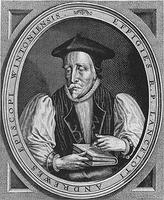 Active in church and secular politics, especially in their overlap, Andrewes advised James I of England and was on the committee of scholars responsible of the Authorized Version of the Bible. Indeed, his name is first on the list of translators, since he both provided translations of early parts of the Old Testament and served as an editor general of the entire work.
Active in church and secular politics, especially in their overlap, Andrewes advised James I of England and was on the committee of scholars responsible of the Authorized Version of the Bible. Indeed, his name is first on the list of translators, since he both provided translations of early parts of the Old Testament and served as an editor general of the entire work.Versed in Latin, Greek, Hebrew and eighteen other languages, Andrewes enjoyed popularity during his life for writings. Next to Bishop Ussher, he may have been the most learned and intellectually brilliant churchman of his day. His apologetic writings included two essays against Robert Bellarmine. Large collections of his sermons remain and may still be read profitably both by lovers of Christ and by lovers of the English language.
Perhaps one of his finest works was the Preces Privatae (Private Prayers). The collection was, however, unavailable to contemporaries but were published after his death. Some sections are complete prayers and collects, other appear to be guides to devout meditation. A biography by James Kiefer includes quotes from the Preces. These selections from the Thursday prayers emphasize three important happenings on that day — the creation of birds and fish on the Fifth Day of Creation, the institution of the Lord's Supper, the Ascension of our Lord on Easter's 40th day.
Andrewes' impact on English arts and letters extended well beyond his life. T. S. Eliot considered him a major influence and wrote an essay in his honor.
Technorati Tags: Lancelot Andrewes | King James Version | King James Bible | T. S. Eliot | Preces Privatae | Authorized Version | Bishop Ussher | Robert Bellarmine
Technorati Tags: Lutheran Carnival | blog carnival | confessional Lutheran | Lutheran
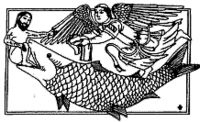 A singular prophet among the many in the Old Testament, Jonah the son of Amittai was born about an hour's walk from Nazareth. His prophetic ministry involved a call to preach at Nineveh, capital of pagan Assyria (Jonah 1:1-2). His reluctance to respond and God's insistence that his call be heeded is the story of the book that bears Jonah's name.
A singular prophet among the many in the Old Testament, Jonah the son of Amittai was born about an hour's walk from Nazareth. His prophetic ministry involved a call to preach at Nineveh, capital of pagan Assyria (Jonah 1:1-2). His reluctance to respond and God's insistence that his call be heeded is the story of the book that bears Jonah's name.Although the swallowing and disgorging of Jonah by the great fish is the most remembered detail of his life, the book address it in only three verses (Jonah 1:17; 2:1, 10). The important theme is how God deals compassionately with sinners.
Jonah's three day sojourn in the belly of the fish is mentioned by Jesus as a sign of His own death, burial, and resurrection (Matthew 12:39-41).
Technorati Tags: Jonah | great fish | whale | Ninevah | Tarshish | Christ | resurrection | Assyria | Prophet Jonah
One day Jesus was walking and saw a tax collector named Matthew sitting at a tax collection post, and said to him, "Follow Me." Matthew stood up and followed Him, becoming one of His twelve apostles (see Matthew 9:9-13; parallels Mark 2:13-17 and Luke 5:27-32).
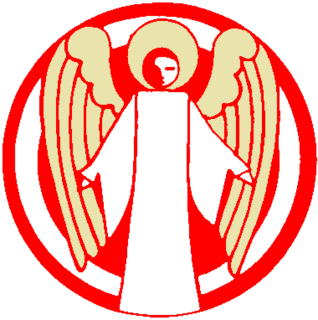 Tax collectors in those days were social outcasts. Devout Jews avoided them because they were usually dishonest (they were expected to make their profits by cheating the people). Nationalistic Jews hated them because they were agents of the Roman government and doubly hated them if (like Matthew) they were Jews, because they had gone over to the enemy, betraying their own people for money.
Tax collectors in those days were social outcasts. Devout Jews avoided them because they were usually dishonest (they were expected to make their profits by cheating the people). Nationalistic Jews hated them because they were agents of the Roman government and doubly hated them if (like Matthew) they were Jews, because they had gone over to the enemy, betraying their own people for money.Throughout the Gospels, we find tax collectors (publicans) mentioned as a standard type of sinful and despised outcast. Matthew brought many of his former associates to meet Jesus, and social outcasts in general were shown that the love of God through His Son extended even to them.
The name "Matthew" means "gift of the Lord." Mark and Luke, in the story of his calling, name him "Levi." Perhaps this was his original name, and he received a new name from Jesus when he became a disciple. Perhaps he was a member of the tribe of Levi. Of Matthew's life after Pentecost, the Scriptures tell us nothing. Later accounts vary: Some report that he was martyred, others that he died a natural death. The Christian community since early times has commemorated him as a martyr.
Lection
Psalm 119:33-40
Proverbs 3:1-6 or Ezekiel 2:8-3:11
Ephesians 4:7-16 or 2:4-10
Matthew 9:9-13
Collect
O almighty God, whose blessed Son has called us even as He called Saint Matthew the tax collector, grant that we also may forsake all sin, all covetous desires and inordinate love of riches, and, casting every care upon Him, may follow our Lord Jesus Christ, who lives and reigns with You and the Holy Spirit, one God, now and forever.
Technorati Tags: Saint Matthew | Matthew | Levi | evangelist | apostle | publican | tax collector | Jesus | disciple
Lay Lutherans who have not yet done so, please read the post Survey Says from about 10 days ago and consider signing up to respond to what promises to be a landmark study of American Lutheranism.
Technorati Tags: Lutheran | survey | attitudes | opinions | religion | politics | society | A Study of Generations | LCMS | WELS | ELCA
To find out more about why I do this, please read What Is the BBOV? and Building a Lutheran Presence; Part 2. Those who'd like the blogroll can either email me or read BBOV Changes for details on obtaining the list from this blog's source code.
Extreme Makeover
Michael Schuermann closed down Poor Michael's Almanac, changed towns, and entered seminary. Somehow, he's also finding time to continue blogging in his new digs, albeit under a different title. Current BBOV users and anyone else interested in astute writing on an incredible variety of subjects are invited to change or set their blogrolls and bookmarks to Life of Michael.
Fall Premiers
This one's not new, either. However, he's back from oblivion. Those who previously profited from reading the Poor Miserable Sinner should be celebrating his return to blogging. New readers looking for solid but accessable theological writing should similarly rejoice.
Ryan Schroeder's Sacred Meditations is his place to post "thoughts on certain passages of Scripture, as well as certain themes of Scripture" and to "spread the comfort of the Gospel to Christians."
What's what? Watt's What — Pastor Jonathan C. Watt, that is. Here he posts "sermons and other writings" from the reaches of Howard, South Dakota.
I'm also making the (long) overdue inclusion of The Boar's Head Tavern a reality. It's not Lutheran-only but there is a strong Lutheran presence and an abundance of humor, theological wrangling, and common sense writing that's all too lacking in today's world.
This completes another round of Aardvark Updates. Again, if you'd like just the confessional Lutheran bloggers or all the links in my sidebar, please click for the Big Blogroll O' Vark®™© and tell me which list you'd prefer. Or do as Pastor Chryst suggests and grab it all for yourself. And if you know of or own a Lutheran blog demonstrating a quia confessional subscription and would like me to consider it for inclusion, please leave me a comment.
Technorati Tags: Aardvark Alley | Big Blogroll O' Vark | BBOV | blogroll | blog roll | Lutheran | confessional Lutheran
Please take note of these fantastic offerings for growing in faith and knowledge as confessional Lutherans.
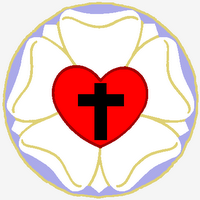 High school aged LCMS youth are invited to a special Higher Things retreat on 3-5 November in Marshall, Michigan. The cost is low, the presenters are first rate, and the hosting looks to be superb. Speakers and their topics include Pastor Rod Zwonitzer, "Different Paths to Becoming a Christian Arguer"; Pastor David Fleming, "History's Great Cloud of Christian Debaters"; and Dr. Mark Kalthoff, "How to Argue with Teachers and Professors." Also speaking is Pastor Klemet Preus, author of The Fire and the Staff. Registration continues through 18 October.
High school aged LCMS youth are invited to a special Higher Things retreat on 3-5 November in Marshall, Michigan. The cost is low, the presenters are first rate, and the hosting looks to be superb. Speakers and their topics include Pastor Rod Zwonitzer, "Different Paths to Becoming a Christian Arguer"; Pastor David Fleming, "History's Great Cloud of Christian Debaters"; and Dr. Mark Kalthoff, "How to Argue with Teachers and Professors." Also speaking is Pastor Klemet Preus, author of The Fire and the Staff. Registration continues through 18 October.Older orthodox Lutherans can also find reason to head north rejoicing as they grow in wisdom and understanding. The northern United States also provides the venue for the Confessional Worldview Seminar on 19-21 October at King of Grace Evangelical Lutheran Church in Golden Valley, Minnesota. Their blog includes schedule, information on presenters and topics, and various updates. Registration dealine is 5 October, so hurry if you want to attend!
Technorati Tags: Higher Things | confessional Lutheran | Lutheran | Confessional Worldview Seminar | high school | retreat
 I checked first, making sure that the Alley didn't make the PC World list of The 25 Worst Web Sites of All Time. I'm sure that many of my erudite readers will agree with the worst of the worst — as well as many of the others.
I checked first, making sure that the Alley didn't make the PC World list of The 25 Worst Web Sites of All Time. I'm sure that many of my erudite readers will agree with the worst of the worst — as well as many of the others.However, I don't think PC World found or remembered them all, so readers are invited to leave suggestions for other "worthy" sites in the comments. Please give site name, reasons for inclusion, and warnings about content, popups, etc. If I get enough, of them, I'll publish the Aardlist in a separate post. Extra points for places that are belly-up in real time and exist only in human memory or upon the servers of the Internet Archive's Wayback Machine.
Technorati Tags: PC World | worst web sites | humor | Internet Archive | Wayback Machine
 Cyprian (Thascius Caecilius Cyprianus) was born around AD 200 in the north African city of Carthage to a well-established pagan family. Most scholars believe that he came from either Punic or Berber stock. That he was of the privileged class may be shown, in part, from his place of death: He was martyred in his own villa.
Cyprian (Thascius Caecilius Cyprianus) was born around AD 200 in the north African city of Carthage to a well-established pagan family. Most scholars believe that he came from either Punic or Berber stock. That he was of the privileged class may be shown, in part, from his place of death: He was martyred in his own villa.After receiving a quality (albeit pagan) education, Cyprian became a Christian and was baptized sometime between 245 and 248. He passed quickly through the ranks of clergy, being ordained in short order as deacon, then presbyter. Election and consecration as Bishop of Carthage followed in short order, sometime during 248 or 249. This delighted the poor of the community, who'd benefited greatly from Cyprian giving away much of his wealth after his baptism, but a party in the Carthage church opposed him throughout his episcopacy.
During the persecution of Roman Emperor Decius, Cyprian fled Carthage but returned two years later. During his absence, some accused him of cowardice or lack of faith while others defended him for remaining alive to help govern the church. His own testimony was that he acted as God willed him to do through visions and divine commands. From hiding, he remained a faithful ruler of his flock, acting through a deacon brave enough to carry his words back to Carthage.
Upon his return from exile, Cyprian had to deal with the problem of Christians who had lapsed from their faith under persecution and now wanted to return to the Church. He decided that they could be restored, but that restoration would come only after a period of penance demonstrating their faithfulness. During the following years, Cyprian also became part of the debate over the efficacy of baptism administered by heretics. While some said only the form was essential, Cyprian claimed that even if all the words and actions were correct, it was no baptism if administered outside the Church. Therefore, Cyprian directed that any who were baptized in heretical sects would be given Christian baptisms before being joined to the Church. A majority of the North African bishops agreed with him, but this rigorous interpretation of dogma was later moderated by the Church.
His position in the matter of heretic baptisms places him squarely among many North African theologians of the period. He seems to be a way station between the strictness of Tertullian and the even more extreme doctrinal interpretations of the Donatists, who concerned themselves with the efficacy of the Lord's Supper being administered by a priest who lapsed or recanted the faith during times of persecution.
During persecution under Emperor Valerian, Cyprian first went into hiding and later gave himself up to the authorities. He was beheaded for the faith in Carthage in the year 258. According to witnesses, his only words upon hearing the death sentence pronounced were, "Thanks be to God!"
Besides fulfilling his pastoral and episcopal obligations, Saint Cyprian gave himself to theological writing. His most noted work was De unitate ecclesiae, where he professed belief in one episcopate — not that of Rome, but of the Church at large — as the foundation of the Church. In this treatise he wrote, "He can no longer have God for his Father who has not the Church for his mother; ... he who gathers elsewhere than in the Church scatters the Church of Christ." In the same work, he also said, "Nor is there any other home to believers but the one Church." Unlike some of his contemporaries, especially those who may have acted out of jealousy over his popularity, most modern scholars and average Christians who study him are left with a quite favorable impression of the man.
Note: The liturgical calendar of The Lutheran Church — Missouri Synod transfers the commemoration of Saint Cyprian to this day since 14 September is Holy Cross Day. This is in line with the practice of much of the Christian Church.
Lection
Psalm 23 or 116:10-17
1 Peter 5:1-4, 10-11
John 10:11-16
Collect
Almighty God, who gave Your servant Cyprian boldness to confess the Name of our Savior Jesus Christ before the rulers of this world and courage to die for this faith, grant that we may always be ready to give a reason for the hope that is in us, and to suffer gladly for the sake of our Lord Jesus Christ; who lives and reigns with You and the Holy Spirit, one God, now and forever.
Technorati Tags: Cyprian of Carthage | Saint Cyprian | Decius | Decian persecution | Valarian | Valarian persecution | Donatism | Tertullian | Christian feasts | liturgical calendar | Church Calendar
Born in Florence, Italy, in 1265, Dante Alighieri stands among the true and lasting giants of Western letters. Unquestionedly the greatest Italian poet, many (I think rightly) laud him as one of the two or three absolute masters of all time. Yeats called him "the chief imagination of Christendom" while Eliot said, "Dante and Shakespeare divide the modern world between them. There is no third." Considering the artistic gifts of Yeats and Eliot, how can we argue?
Dante's Italy was not a united country (some would say this holds true to this day) but mainly a collection of small city-states. While we rightly think of Italy as the cradle of the Renaissance, the late Middle Ages saw the land embroiled in feuds and power struggles between noble families leading to an unending series of inter-state and civil wars. During Florence's May Festival in AD 1300, an accident led to a brawl which soon became a civil war. As heir of a poor but noble family, Dante was one of the city's elected officials. When the dust from the war settled, he and other leaders of his party were overthrown and exiled. He spent the rest of his life in exile, pining for his native Florence.
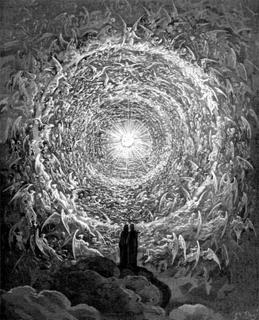 Dante's literary star began its ascendence in 1293, when he published the Vita Nuova (The New Life). Through it, he related falling in love with a young girl (Beatrice), finding happiness in thinking of her and looking at her from afar. His Beatrice would return as muse for his greatest work.
Dante's literary star began its ascendence in 1293, when he published the Vita Nuova (The New Life). Through it, he related falling in love with a young girl (Beatrice), finding happiness in thinking of her and looking at her from afar. His Beatrice would return as muse for his greatest work.Somewhere around 1304, he wrote De Vulgari Eloquentia. It argued that literature and poetry should be written in the "vulgar" (native) tongue of the people rather than in Latin. While not totally novel, this new approach helped usher in the great flood of works written for the masses during the end of the Middle Ages and the Renaissance. Indirectly, we might even find a connection to the "vulgar" Bible translations which began to be found, including those of Wycliffe, Luther, and others.
Il Convivio (The Banquet), written at the same time, discussed grammar and poetry. It claimed that some of his own works, especially those in the Vito Nuova, were been largely misunderstood.
In 1313 he tackled the kingdom of the left hand with De Monarchia (On Monarchy), an argument that that secular authority derives directly from God, not through the authority of the Church. However, he would not excuse godless government, noting that the prince should act as any other Christian, being guided by the Church's moral instruction.
We aren't sure when he began writing his masterpiece, the Commedia (Comedy). As we read it, we need to understand that a "comedy," in the traditional sense, means an account beginning in sorrow, suffering, or other pain and ending in joy. So it is here, as the narrator leads us from Hell through Purgatory and finally into heaven. While he gave it the single-word title, Giovanni Boccaccio later referred to it as The Divine Comedy, the name by which most still know it. Dante apparantly finished the first of its three parts by 1314, completing the final portion just before his death on in 1321.
The Comedy has, since its creation, inspired artists to draw, paint, or otherwise render its wonders. Among the most noted are Domenico di Michelino, William Blake, and Gustave Doré, whose interpretation of Dante and Beatrice viewing the highest heaven is shown above.
For more about Dante's life and times and details of the Comedy, please follow links from the Wikipedia article or see the biography from James Kiefer's Hagiographies.
Technorati Tags: Dante | Dante Alighieri | Divine Comedy | Inferno | Hell | Purgatorio | Purgatory | Paradiso | Paradise | Beatrice | Dante's Inferno
During the reign of Constantine the Great, the first Roman Emperor to profess the Christian faith, his mother Helena went to Israel, hoping to find the places especially significant to Christians. Having located, close together, what she believed to be the sites of the Crucifixion and of the Burial (at locations that many modern archaeologists think may be correct), she then had built over them the Church of the Holy Sepulcher, which was dedicated on 13 September 335. On the next day, the purported section of the cross was brought outside the church for others to view. Thus began a day for recognizing the cross of Christ in a festal atmosphere that would be inappropriate on Good Friday. It stands as a symbol of triumph, as a sign of Christ's victory over death, and a reminder of His promise, "And I, when I am lifted up from the earth, will draw all people to myself. (John 12:32)"
The day is known by different names in various parts of Christendom. The Eastern Orthodox and Eastern Rite Catholic Churches know it as "Feast of the Exaltation of the Cross" while the Latin Rite of the Roman Catholic Church calls it the "Triumph of the Cross." Most other liturgical churches simply call it "Holy Cross Day."
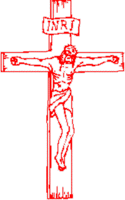 The Christian custom of tracing the sign of the cross on people and things as a sign of blessing is very old. Some think that it goes back to the very origins of Christianity and earlier. In Ezekiel 9, we read that Ezekiel had a vision of the throne-room of God, in which an angel was sent to go through Jerusalem and put a mark on the foreheads of the faithful few who mourned for the sins of the city. Afterwards, other angels were sent through the city to destroy all those who had not the mark.
The Christian custom of tracing the sign of the cross on people and things as a sign of blessing is very old. Some think that it goes back to the very origins of Christianity and earlier. In Ezekiel 9, we read that Ezekiel had a vision of the throne-room of God, in which an angel was sent to go through Jerusalem and put a mark on the foreheads of the faithful few who mourned for the sins of the city. Afterwards, other angels were sent through the city to destroy all those who had not the mark.We find similar visionary material in Revelation 7:2-4; 9:4; and 14:1, where the mark on the forehead again protects the faithful few in the day of wrath. There, it is said to be the name of the Lamb and of His Father.
What is the significance of the sign of the cross? In the first place, we often place our initials or other personal mark on something to show that it belongs to us. The cross is the personal mark of Our Lord Jesus Christ, often traced upon our foreheads and hearts at our baptisms. We mark it on ourselves as a sign that we belong to Him, just as in the book of Revelation, as noted above, the servants of God are sealed or marked on their foreheads as a sign that they are His.
As one preacher said, if you were telling someone how to make a cross, you might say, "Draw an 'I' and then cross it out." As we make the sign, we first draw a vertical stroke, as if to say to God, "Lord, here am I." Then we cancel it with a horizontal stroke, as if to say, "Help me, Lord, to abandon my self-centeredness and self-will; make Yourself the center of my life instead. Fix all my attention and all my desire on You, Lord, that I may forget my self, cancel my self, abandon myself completely to Your love and service."
Lection
Psalm 98:1-5
Isaiah 45:21-25
1 Corinthians 1:18-24
John 12:20-33
Collect of the Day
Merciful and everlasting God, You did not spare Your only Son but delivered Him up for us all that He might bear our sins on the cross. Grant that our hearts may be so fixed with steadfast faith in Him that we may not fear the power of any adversaries; through Jesus Christ, your Son, our Lord, who lives and reigns with You and the Holy Spirit, one God, now and forever.
Technorati Tags: Holy Cross Day | Exaltation of the Cross | Triumph of the Cross | Constantine the Great | Helena | crucifixion | true cross | Jesus Christ
 I participated in the earlier pastoral portion of this survey and will be forwarding the invitation to the laity to my congregation. However, other confessional Lutheran lay people might also be interested in becoming part of such a landmark examination of who we are, where we've come from, and where we're going. I extend to my readers the following invitation:
I participated in the earlier pastoral portion of this survey and will be forwarding the invitation to the laity to my congregation. However, other confessional Lutheran lay people might also be interested in becoming part of such a landmark examination of who we are, where we've come from, and where we're going. I extend to my readers the following invitation:
Dear Fellow Lutherans,
We need your help.
In 1972 the last major study of Lutherans was completed. Merton Strommen's Study of Generations surveyed 5,000 Lutheran pastors and lay members on religious, political and social attitudes.
Last year, with generous grants from The Luther Institute and Concordia University Wisconsin, we launched an ambitious project to again survey thousands of Lutherans — in part, to see how much those attitudes have changed since 1972. We have already surveyed 2,000 pastors and have now launched the study second phase — a survey of 3,000 lay members.
For this, we need your help. The web-based survey of lay members takes about 25 minutes to complete and can be taken from your home computer.
Simply send an e-mail to LutheranSurvey AT cuw DOT edu. We will save your e-mail address and, within a few weeks, send you an e-mail invitation with a link to the survey.
Your e-mail address will be kept confidential and used ONLY for the survey. And no connection will be made between your e-mail address and the responses you give.
Please consider participating in this important study. Just a few minutes of your time will be of great service to your church and to the church at large. Thank you!
James Burkee, Ph.D.
Jeff Walz, Ph.D.
Concordia University Wisconsin
Note: If any other bloggers reproduce this invitation, please do not set a "mailto" link for the survey edress so that we might keep spam to a minimum.
Technorati Tags: Lutheran | survey | attitudes | opinions | religion | politics | society | A Study of Generations | LCMS | WELS | ELCA
The exotic locale of the Outer Rim Territories forms the backdrop for Lutheran Carnival #32. Christopher Gillespie has done an excellent job of compiling others' posts and of composing an informative opening essay on confessional Lutheranism. Thanks to Christopher and to all who submitted.
Technorati Tags: Lutheran Carnival | blog carnival | confessional Lutheran | Lutheran
Most of this group come from within confessional Lutheranism. However, some come from other places listed in my blogroll. The basic order of posts this time is alphabetical by blog name. However, I grouped the final four into two thematic groups.
‡ Ted and Rick of Agnus Day often do a marvelous job of illustrating one of the Sunday readings. I imagine that many people, including most of the pastors I know, will get a chuckle out of Ted's response to Rick's tongue biting in this illustration of Mark 6:1-13.
‡ Each blog owner seems to have his or her own opinion about the vocational or avocational aspects of blogging. I think that The Masks of God from Be Strong in the Grace comes really close to my way of thinking while at the same time touching my heart with her memories of her pastor's young son.
‡ The Beast's Lair, which I discovered through The Burr in the Burgh, is a favorite non-Lutheran blog. In God ... Our Only Hope and Greatest Threat, the Beast the the Burr discuss how it is that God moves us both to love and to fear Him.
‡ After a bit of down time, Pastor Klages of A Beggar at the Table came back to profiling heretics with his well-written history of Carpocrates, a noted Gnostic.
‡ Jon Ledetroit of Beggars All examines the importance of language in theology with Getting "Snowed": How Today's Lutherans Are the Unwitting Test Subjects of the Sapir-Wolf Hypothesis.
‡ Not the cop show, not the parable of our Lord — Drag Net, by Stephen Byrnes of Black Cloister points to sources showing how the internet is slowing down and speculating about the problems that might come from increased governmental or corporate involvement.
‡ If you're talking about God and whales, as was Cruce Tectum, you're probably talking about Moby Dick. And if you're going to talk about Moby Dick, I hope you can summarize it as well as did Pastor Krenz.
‡ If a bit of light reading about the "joys" of parenthood interests you, you should enjoy I'm Baa-aack! at Effie's World. All I can add is, "Boy, did I get off easy!"
‡ Rachel Engebretson of Here I Stand remains a favorite young blogger. You'll see why when you read Crosshairs on Good and follow her take on being "offensive."
‡ Okay, now it's time for the sing-along. Please turn in your
‡ Almost anything from I Trust When Dark My Road merits Aardie consideration. The Bad Day, including its gallows humor cartoon, really helps illustrate just how depressing depression can be.
‡ Pastor Alms got his commenters rocking with his Springsteen inspired post Rosie, Come Out Tonight at Incarnatus Est.
‡ G.I.G.O. is more than a computer acronym, according to Living Stones. See what she means with Eating from the Dumpster.
‡ Luther at the Movies invokes the FTC as he makes An Immodest Proposal concerning the glut of pseudo-Christians blathering about in these United States.
‡ After seeing many of the various "Luther created Hitler" conspiracy theories, I wondered if anything could be new under that revisionist sun. Evidently some people are still trying to get mileage out of blaming Christianity for Nazism. Uwe Siemon-Netto shows and analyzes some of the recent writings with The Nazis — Pagans or a Heretic's Heirs?
‡ He may be a Part-Time Pundit but John Bambenek is a full-time good writer, including much on life issues. Associated Press Embraces Bias and Supports Abortionists in News Coverage shows how media stylebooks skew reporting on abortion issues and laments the lack of objectivity that turns most "news" organizations into opinion mills.
‡ A few days back, St. James the Hoosier asked his LCMS readers An Open Question as to why we are Lutheran, particularly Lutheran Church — Missouri Synod. Feel free to join in the comments.
‡ With merely A Handful of Nails, Jason Evans of TheologyGeekBlog reminded me of the glory days of The Wittenburg Door by sharing some recent output from the venerable religious satire magazine.
‡ Kobra's short post Calvin=No Gospel triggered a lengthy discussion in the comments as he accused Calvinism of having "no problem with speaking of God apart from mentioning Christ" at Theomony.
‡ Bob Waters of watersblogged! gets into the Iowa caucuses and the politics of the smoke-filled room as he asks, Anybody Got a Cigar?
‡ Ryan Schroeder of What Did Jesus Do gets the double-Aardie for a pair of posts. First he deconstructs the Joel Osteen Bible Pledge and then writes why it is that Satan Loves Church.
‡ In part because it seems so surprising, in part because I went to high school in the 70s, I liked the brief article at World Magazine by Aaron Earls explaining why School's No Longer Out for Alice Cooper.
‡ In different ways, two bloggers had interesting things to write about the Law. The Orthodox Lutheran David Whalen used the Red Hot Chili Peppers to comment How Christians Can Fulfill the Law by Love. A week later, Eric Matthaei (still On the Wittenberg Trail) showed a fine understanding of Gospel and Sacraments as he ripped into The Religion of the Law.
‡ We actually had another double winner — watersblogged! Bob helped us in the "seeing is not believing" department by showing why Reuters Pulls Doctored Photo. Michael McCullough's Stingray ripped into the same news organization and, by extension, much of the mainstream media in Reuters Employee Writes "Zionist Pig" Death Threat.
Keep on writing the good stuff and please remember, winners are invited to link back to this post so more people can discover the wonderful breadth of fine blogging the Aardies seek to expose.
Technorati Tags: Golden Aardvark Aaward | Golden Aardvark | Aardie | A.A.R.D.I.E | Aardvark Alley | blog award | raillery | doctrine | intellect
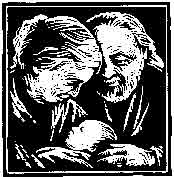 Zechariah (or Zachariah) and Elizabeth were "righteous before God, living blamelessly according to all the commandments and regulations of the Lord. (Luke 1:6)" The angel Gabriel greeted Zechariah, a priest in the temple in Jerusalem, announcing that Zechariah and Elizabeth would become parents of a son. Initially he didn't believe Gabriel because of their old age. For this, Zechariah became unable to speak.
Zechariah (or Zachariah) and Elizabeth were "righteous before God, living blamelessly according to all the commandments and regulations of the Lord. (Luke 1:6)" The angel Gabriel greeted Zechariah, a priest in the temple in Jerusalem, announcing that Zechariah and Elizabeth would become parents of a son. Initially he didn't believe Gabriel because of their old age. For this, Zechariah became unable to speak.After he was born, Elizabeth named their son John. As friends and relatives sought to change her mind, they asked Zechariah to write down what it should be. Suddenly, his voice returned and he confirmed his wife's choice. In response to receiving his son and his voice, he sang the Benedictus, a beautiful summary of God's Old Testament promises and a prediction of John's work as forerunner to Jesus (Luke 1:68-79). We remember their examples of faithfulness and piety and honor them for raising the last great prophet of the coming Christ, John the Baptist.
Those familiar with older translations of Holy Scripture might remember them slightly differently. That's because the King James and some other versions use the Greek form of their names, calling them Zacharias and Elisabeth.
The Benedictus
Blessed be the Lord God of Israel,
for he has visited and redeemed his people
and has raised up a horn of salvation for us in the house of his servant David,
as he spoke by the mouth of his holy prophets from of old,
that we should be saved from our enemies
and from the hand of all who hate us;
to show the mercy promised to our fathers
and to remember his holy covenant,
the oath that he swore to our father Abraham,
to grant us that we, being delivered from the hand of our enemies,
might serve him without fear,
in holiness and righteousness before him all our days.
And you, child, will be called the prophet of the Most High;
for you will go before the Lord to prepare his ways,
to give knowledge of salvation to his people
in the forgiveness of their sins,
because of the tender mercy of our God,
whereby the sunrise shall visit us from on high
to give light to those who sit in darkness and in the shadow of death,
to guide our feet into the way of peace.
Technorati Tags: Zechariah | Zachariah | Zacharias | Elizabeth | Elisabeth | Gabriel | John the Baptist | John the Baptizer | Benedictus
Q: Who is the world record-holding chiropracter?
A: Moses. He dealt with a million stiff-necked people.
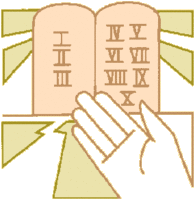 Today we commemorate Moses, who was born in Egypt several generations after Joseph brought his father Jacob and his brothers there to escape a famine in the land of Canaan. Although Joseph certainly delivered Egypt from the effects of the famine, at some later time, a change in regimes brought a change in Egyptian attitude toward the Hebrews in their midst. As this happened, the sons of Israel began to know affliction.
Today we commemorate Moses, who was born in Egypt several generations after Joseph brought his father Jacob and his brothers there to escape a famine in the land of Canaan. Although Joseph certainly delivered Egypt from the effects of the famine, at some later time, a change in regimes brought a change in Egyptian attitude toward the Hebrews in their midst. As this happened, the sons of Israel began to know affliction.By the time Jacob's descendants had lived in Egypt for 400 years, they were in slavery. Because they were worried about a rapidly expanding population of Hebrews, the Egyptians ordered the Israelites to kill their male children. When Moses was born, his mother had his elder sister put him in a basket and set it afloat among the reeds in the Nile River. Pharaoh's daughter found him and raised by her as her own son (Exodus 2:1-10). At age forty Moses killed an Egyptian taskmaster and fled to Midian, where he worked as a shepherd for most of his exile. There he married Zipporah, daughter of Jethro the priest of Midian (2:11-22).
After another 40 years had passed, the Lord called him through the burning bush to go back to Egypt and tell Pharaoh to release Israel from its bondage (Exodus 3). He came to Pharaoh and told him that the Lord said, "Let My people go, that they may hold a feast to Me in the wilderness. (5:1)" After a series of plagues, the Israelites celebrated the first Passover, the Lord struck down the first-born males throughout Egypt, Pharaoh capitulated, and Moses led them out.
At the Red Sea the Egyptian army was destroyed and the Israelites passed to safety on dry land (Exodus 12-15). At Mount Sinai they were given the Law and then erected the Tabernacle (19ff.). Because of disobedience, they had to wander in the wilderness for forty years. Moses himself was not allowed to enter the Promised Land, although God allowed him to view it (Deuteronomy 34).
In the New Testament Moses is referred to as lawgiver and prophet. Before his death, Moses promised Israel that the Lord would "raise up for you a prophet like me from among you. (Deuteronomy 18:15)" This prophecy found fulfillment in Jesus Christ. The first five books of the Bible, sometimes called the Pentateuch, are attributed to Mosaic authorship.
Technorati Tags: Moses | Hebrews | Israel | Exodus | Egypt | plagues | Passover | Pentateuch
 Living at a time when political and religious leadership in Europe often depended upon force of arms or strength of will more than the rule of law, Gregory became one of the continent's greatest leaders in both the secular and sacred arenas of his era. Born around AD 540, he became Prefect of Rome. In this capacity, he restored economic vitality to his native city following years of political upheaval and invasions by various Germanic tribes.
Living at a time when political and religious leadership in Europe often depended upon force of arms or strength of will more than the rule of law, Gregory became one of the continent's greatest leaders in both the secular and sacred arenas of his era. Born around AD 540, he became Prefect of Rome. In this capacity, he restored economic vitality to his native city following years of political upheaval and invasions by various Germanic tribes.He later sold all his properties, donated the proceeds to help the poor, he entered into full-time service in the Church as a monk. Although he seemed content with the monastic life, his intellectual abilities and theological acumen led him on to ordination, which finally climaxed with his election on 3 September 590 as Bishop of Rome.
In this office, he oversaw growth in church music and liturgical development; the style of liturgical music known as Gregorian Chant is still used in much of Western Christendom. He also established a church-year calendar still used by many churches in the western World today. His concern for the poor continued and he oversaw the construction of a hospital that served dinner to the underprivileged next to his home.
A chance encounter led to his championing of missionary outreach to northern Europe: After meeting English prisoners in a Roman slave market, he directed a monk and prior of the Monastery of Saint Andrew named Augustine to begin mission work in the British Isles. This man, later known as Saint Augustine of Canterbury (not the better-known Augustine of Hippo), did much to spread Christianity throughout Britain.
Gregory was the first pope of the Roman Church to come from a monastic background. His book Liber Regulae Pastoralis (The Book of the Pastoral Rule) was a standard text until the 20th Century. Church historians consider Gregory to be the last of the Latin Church Fathers and count him among the Doctors of the Church (see the commemoration of Saint Ambrose for the list of the eight great doctors). He died on 12 March AD 604. The Eastern Church remembers him as Gregory Dialogus in honor of the Dialogues he wrote.
Lection
Psalm 57:6-11 or 33:1-5, 20-21
1 Chronicles 25:1a, 6-8
Mark 10:42-45
Collect
Almighty and most merciful Lord, who raised up Gregory of Rome to be a servant of the people of God and inspired him to send missionaries to preach the Gospel to the English people, preserve in Your Church the catholic and apostolic faith he confessed, that Your people, being fruitful in every good work, may receive the crown of glory that never fades away; through Jesus Christ our Lord, who lives and reigns with you and the Holy Spirit, one God, now and forever.
Technorati Tags: Saint Gregory the Great | Saint Gregory | Gregory the Great | Gregory I | Gregory Dialogus | papacy | Bishop of Rome | Augustine of Canterbury | Gregorian Chant | Doctor of the Church
 Hannah was the favored wife of Elkanah the Ephraimite. For many years she remained barren, suffering the insults of Elkanah's other wife, Peninnah — even though he said what he could to try comforting Hannah.
Hannah was the favored wife of Elkanah the Ephraimite. For many years she remained barren, suffering the insults of Elkanah's other wife, Peninnah — even though he said what he could to try comforting Hannah.Finally the Lord relieved her of her bitterness (1 Samuel 1:6-8). After she poured herself out in prayer before the Tabernacle, the priest Eli sent her on the way with the promise that the Lord would hear and answer her prayer.
While Scripture gives no indication that Eli even knew the specifics of her petitions, his promise to the distraught woman came to pass and she bore a son, whom she named Samuel ("Heard by God"), "for she said, 'I have asked for him from the Lord.' (vv. 9-21)"
After weaning him, Hannah expressed gratitude by returning him for a life of service in the House of the Lord with Elkanah's consent and blessing (1:24-28). Her prayer of thanksgiving (2:1-10) foreshadows the Magnificat, the Song of Mary which would be sung centuries later during her Visitation to her cousin Elizabeth (Luke 1:46-55).
The name Hannah derives from the Hebrew word for "grace" or "favor." We remember and honor her for joyfully keeping the vow she made before her son's birth.
Technorati Tags: Hannah | Elkanah | Samuel | judge | prophet | Israel | Eli

